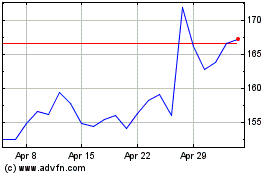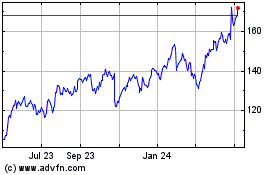By Rob Copeland
YouTube agreed to provide new protections for children on its
platform and pay a $170 million fine, in a settlement that
sharpened government debate over how to rein in technology
giants.
The Federal Trade Commission and the New York state attorney
general announced the penalty for YouTube following a yearlong
investigation in response to complaints from consumer groups, which
said the video platform illegally collected data on children to
sell ads for products such as Barbie dolls and Play-Doh. The FTC
said YouTube tracked internet activity for children under age 13,
with the goal of keeping viewership high.
YouTube neither admitted nor denied wrongdoing as part of the
settlement. No executives at YouTube or its parent, Google, were
penalized. Democratic commissioners on the FTC, including the
outspoken Rohit Chopra, voted against the action, losing in a 3-2
vote.
YouTube Chief Executive Susan Wojcicki said YouTube would make
changes to its platform, including switching off comments on
children's videos and cutting off data collection on videos aimed
at kids. These changes, YouTube said Wednesday, would take effect
in January to give video creators time to adjust.
The broad outlines of the settlement were previously reported,
but the comments from commissioners show that regulators remain
divided on the best approach for reining in Silicon Valley's
biggest powers.
The FTC's Republican leadership noted that the fine far exceeded
previous penalties in similar cases. But minority Democrats said
the FTC should have sought bigger financial penalties and also
larger changes to YouTube's business practices. The disagreement
reflects a debate largely between Republicans and Democrats in
Washington over how -- and how much -- to ramp up regulation of the
major tech platforms.
Yet even some Republicans objected to the pact announced
Wednesday.
Sen. Josh Hawley (R. Mo.), who has been a persistent critic of
Silicon Valley, tweeted that the fine is "an insult to every parent
in America who has had their children's privacy violated."
Google, a unit of Alphabet Inc., is at the beginning of widening
regulatory interest in Washington. The Justice Department has
opened an antitrust investigation into the company's dominant
search platform, while a series of state attorneys general are
expected to unveil their own intentions next week. Google
executives have previously contended the company doesn't have
monopolistic power in its various markets.
The enforcement action echoes the controversial
post-financial-crisis enforcement of big banks and other financial
institutions. Left-leaning politicians and other consumer-advocacy
groups have said big banks didn't pay stiff enough penalties.
The $170 million in fines from the FTC and New York state amount
to less than 2% of Google's profits in the past quarter. The
settlement mandates that YouTube in the future not violate the
federal Children's Online Privacy Protection Act, though child
advocacy groups have argued YouTube wasn't permitted to violate the
law in the first place.
FTC Commissioners Joseph Simons and Christine Wilson, both
Republicans, said the settlement forestalled a potentially
drawn-out legal battle. "We choose not to gamble the protection of
children now in hopes of hitting a jackpot in the future," the two
said in a joint statement.
Mr. Chopra said in dissent that the penalty was too weak to
deter Google or YouTube from trying again to capitalize on its
young users. "The company baited children using nursery rhymes,
cartoons and other kid-directed content on curated YouTube channels
to feed its massively profitable behavioral advertising business,"
he said.
The partisan divide also may reflect the influence of
progressive Democratic presidential candidates such as Elizabeth
Warren and Bernie Sanders, who often criticize tech platforms. Ms.
Warren has made tougher regulation of big tech a high profile
issue, and Mr. Chopra, who previously served at the Consumer
Financial Protection Bureau, is an ally of hers.
"I am a little saddened, I have to say, by the partisan divide
personally," Andrew Smith, director of the FTC's bureau of consumer
protection, said Wednesday. "I think this is a really strong
settlement, and I think that it passes muster under anybody's
standards."
The FTC voted in July to impose a $5 billion penalty on Facebook
Inc. for broader deceptions that included luring consumers into
sharing personal information. The Democratic commissioners also
voted against that action.
Amid the partisan battles, there are signs that the two parties
might find ways to work together. New York Attorney General Letitia
James, a Democrat, joined the FTC's settlement Wednesday.
The Wall Street Journal first reported in June that YouTube was
preparing major changes to its children's platform in response to
the FTC's investigation. The FTC said it launched its own
investigation but also got help from advocacy groups including the
Campaign for a Commercial Free Childhood and the Center for Digital
Democracy.
The changes announced Wednesday fall on the lighter end of what
was under consideration internally by regulators. No children's
content will be removed from YouTube, though it may become less
appealing or harder to find once YouTube turns off commenting on
content aimed at children under 13.
"We will treat data from anyone watching children's content on
YouTube as coming from a child, regardless of the age of the user,"
the company said.
YouTube said it recommends children younger than age 13 use its
YouTube Kids platform when watching videos independently, adding
that YouTube Kids attracts tens of millions of viewers each
week.
The changes will require creators themselves to mark their
videos as aimed at youngsters and they remove the option for
creators to serve personalized ads on children's content.
Advertisers say understanding users' online browsing activity helps
provide more relevant ads.
The company said it is establishing a $100 million fund for
creators to develop original children's content on YouTube and
YouTube Kids.
With the settlement, Google said updating its rules around
children's content has become necessary because YouTube's audience
has evolved over time.
"From its earliest days, YouTube has been a site for people over
13," the company said, "but with a boom in family content and the
rise of shared devices, the likelihood of children watching without
supervision has increased."
--Sarah E. Needleman, John McKinnon and Ryan Tracy contributed
to this article.
Write to Rob Copeland at rob.copeland@wsj.com
(END) Dow Jones Newswires
September 04, 2019 15:08 ET (19:08 GMT)
Copyright (c) 2019 Dow Jones & Company, Inc.
Alphabet (NASDAQ:GOOGL)
Historical Stock Chart
From Mar 2024 to Apr 2024

Alphabet (NASDAQ:GOOGL)
Historical Stock Chart
From Apr 2023 to Apr 2024
